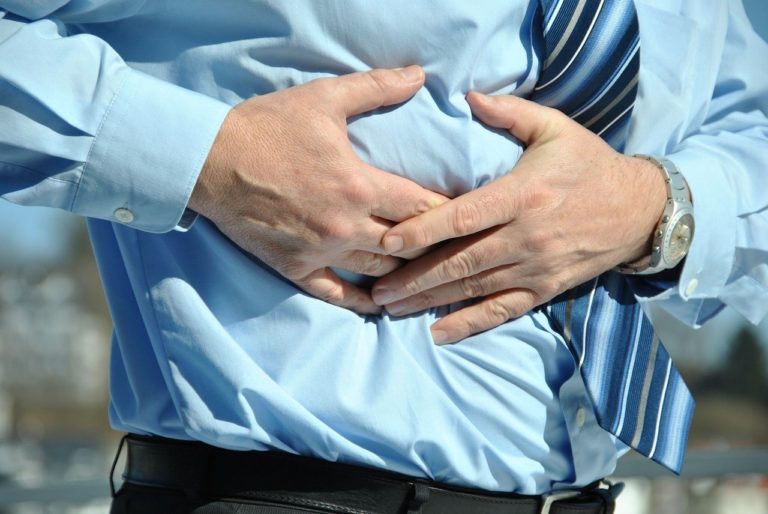 Key Takeaways:
Key Takeaways:
-
Alcoholic gastritis is a type of stomach inflammation caused by prolonged alcohol use, which erodes the protective lining of the stomach and increases acid production.
-
Common symptoms of alcoholic gastritis include sharp stomach pain, bloating, nausea, and loss of appetite, especially after drinking alcohol.
-
If left untreated, alcoholic gastritis can lead to serious complications, including stomach ulcers, internal bleeding, anemia, and increased risk of stomach cancer.
-
How long does it take to heal from alcoholic gastritis? Healing time varies, but stopping alcohol use and implementing lifestyle changes can help restore the stomach lining over time.
-
Treatment for alcoholic gastritis often includes stopping alcohol use, managing stress, and taking medications such as proton pump inhibitors, H2 blockers, or antacids to reduce stomach acid and support recovery.
If you experience feelings of pain in your stomach or a burning feeling in your chest after drinking alcohol, you may be suffering from alcoholic gastritis.
This condition is quite common for people who consume alcohol on a very regular basis over many years. It is one of many negative health side effects caused by drinking alcohol. If left untreated, alcoholic gastritis can lead to a number of uncomfortable or even dangerous complications.
If you or someone you know is a heavy or frequent drinker of alcohol, read on. It’s important that you learn about alcoholic gastritis. That way, you can recognize its symptoms as soon as they begin and so you or your loved one can seek treatment and/or alcohol rehab as needed. Alcoholic Gastritis take time to heal. Learn more about the healing time of alcoholic gastritis.
What Is Gastritis?
When we eat food and drink beverages, our digestive system breaks these things down. It does so through the secretion of stomach acid and other chemicals. If our stomach wasn’t lined with a protective membrane, those harsh chemicals would break down our stomach as well.
Unfortunately, some of the bad habits in which we as humans participate can damage this lining. Gastritis is the uncomfortable or painful condition that results when this lining begins to disintegrate.
A number of different common bad habits can lead to gastritis.
Many people who work in stressful environments suffer from it. People who smoke or who consume large quantities of caffeine can end up with it, too. If someone takes a lot of aspirin or non-steroidal anti-inflammatory drugs (NSAIDs), he or she may develop symptoms of gastritis. Individuals who eat a lot of high-fat foods or who experience acid reflux after eating may also soon find that they have gastritis symptoms as well.
However, one of the most common indicators of the development of gastritis is the regular consumption of alcohol. This condition is so often linked to alcohol consumption. In fact, alcoholic gastritis has become a specific diagnosis all its own.
Many Americans drink alcohol on a regular basis. Some of these people develop alcohol abuse disorder, but some do not. In either case, it’s likely that most drinkers will also participate in one or more of the other bad habits listed above. This will raise their chances of developing gastritis even further.
How Alcohol Use Exacerbates Gastritis
Alcohol use significantly worsens gastritis by directly irritating the stomach lining and increasing stomach acid production. This irritation leads to inflammation of the stomach lining, making it more vulnerable to damage from digestive fluids. In people with alcohol-induced gastritis, even moderate alcohol consumption can disrupt the mucosa (the protective barrier of the gastrointestinal tract), triggering symptoms like bloating, stomach pain, belching, and loss of appetite.
Chronic drinking alcohol also impairs the body’s ability to heal existing inflammation, increasing the risk of developing stomach ulcers, gastrointestinal bleeding, or even stomach cancer in severe cases. In fact, the connection between alcohol and stomach inflammation is so strong that alcoholic gastritis is recognized as a distinct subtype of gastritis, caused specifically by prolonged or heavy alcohol consumption.
What Are the Symptoms of Alcoholic Gastritis?
There are two different types of gastritis but their symptoms are quite similar. Acute gastritis comes on suddenly and causes intense pain, but it also subsides and even disappears quickly until it returns again. On the other hand, chronic gastritis is a longer-term condition that produces a dull, ongoing, and even constant pain instead.
Both types of gastritis result in stomach pain. In its acute form, gastritis can cause stomach upset and irritability, bloating and gas, and nausea and vomiting. It can also lead to ulcers and even hemorrhage in extreme cases.
Chronic gastritis comes on more slowly as stomach acid eats away at the stomach lining. As a result, people with chronic gastritis may feel a consistent mild stomach pain in their upper abdomen. They may also feel tired or anemic, and they may have difficulty eating at regular mealtimes.
Alcoholic gastritis presents as acute. People who suffer from alcoholic gastritis will experience sharp, intense stomach pain and irritability. They will desire fast relief. Although episodes of this type of gastritis may clear up quickly, it’s important that people who experience these pains see a doctor to avoid long-term complications.
Complications of Alcoholic Gastritis
If alcoholic gastritis is diagnosed and treated, people who suffer from it will not experience any long term effects. However, if it is ignored, it could lead to feelings of dizziness or weakness and shortness of breath. It could also result in internal bleeding, vitamin deficiencies, and polyps or tumors in the stomach.
People who drink heavily often avoid visiting their doctors even when they experience pain. However, it’s crucial that you seek medical advice and treatment if you believe that you are suffering from alcoholic gastritis.
Alcoholic Gastritis Treatment
Because alcoholic gastritis is caused by the regular and ongoing consumption of alcohol, you likely already know how this condition can best be treated. People who suffer from alcoholic gastritis should stop drinking alcohol right away. This will allow their protective stomach membrane to begin to heal.
If you or your loved one suffers from alcoholic gastritis, you should also avoid the other habits mentioned in this post that can further exacerbate this condition. Things like smoking, eating fatty foods, taking aspirin or anti-inflammatory drugs, and caffeine consumption will make the condition worse.
Stressful situations should also be avoided. When they cannot be avoided, healthy responses should be encouraged and cultivated. Going for a walk outside, meditation, taking deep breaths, and journaling are all examples of healthy ways to deal with stress.
Medications to Treat Alcoholic Gastritis
In addition to lifestyle changes and abstaining from alcohol, medications can play a key role in managing alcoholic gastritis symptoms and supporting the healing process. Proton pump inhibitors (PPIs), such as omeprazole or lansoprazole, are commonly prescribed to reduce acid production in the stomach and protect the stomach lining from further irritation. H2 blockers, like ranitidine or famotidine, offer similar relief by limiting stomach acid levels and easing discomfort from reflux, bloating, or abdominal pain.
In some cases, antacids may be recommended for quick, over-the-counter symptom relief. If the inflammation is linked to H. pylori, a common bacterial infection, antibiotics may be required. Patients who have developed complications such as anemia or peptic ulcers may also need additional support, including iron supplements or specialized medications. A thorough evaluation by a healthcare provider is essential to determine the best treatment plan, especially for those with a history of heavy drinking or other substance use issues.
Healing from Alcoholic Gastritis
Alcoholic gastritis is highly treatable. If you stop drinking alcohol, your stomach lining will repair itself in time.
Of course, for many, quitting drinking alcohol is easier said than done. If you find the prospect of stopping drinking terrifying or potentially impossible despite the possibility that you may have a medical condition that can cause long term damage to your body, then you might have a substance abuse disorder. You may need help to break free from it.
Addiction Treatment for Healing Alcoholic Gastritis
Treating alcoholic gastritis effectively means going beyond symptom management. It requires addressing the root cause: alcohol abuse. Without stopping or significantly reducing alcohol use, the inflammation of the stomach lining will likely persist or worsen, leading to complications like internal bleeding, stomach ulcers, or even life-threatening damage to the digestive system. That’s why many individuals benefit from entering a structured alcohol addiction treatment program to support long-term recovery and gut healing.
At New Leaf Detox, you can begin this journey through medical detox and inpatient treatment, ensuring safe withdrawal and 24/7 clinical supervision. For those who need further support, referrals to outpatient programs are available to continue the recovery process. A comprehensive treatment plan may include mental health counseling, relapse prevention strategies, nutritional support, and lifestyle changes to promote lasting wellness—all of which contribute to repairing the gastrointestinal tract and preventing future episodes of alcoholic gastritis.
Don’t be afraid to reach out and seek help. You’ll soon be glad that you did.
If you are looking for help to break free from a dependency on alcohol or drugs in southern California, we would love to help you achieve your goals. New Leaf Detox and Treatment is located in beautiful San Juan Capistrano, just south of Los Angeles. Our experienced staff can help you to find the root of your addiction and can guide you on your first steps on a happy and healthy path that you can celebrate for the rest of your life.
Please give us a call or contact us today. We are here to help and we can’t wait to meet you.














